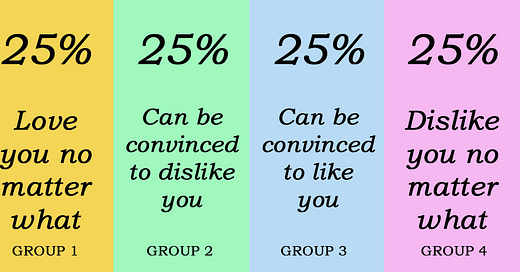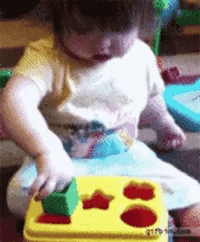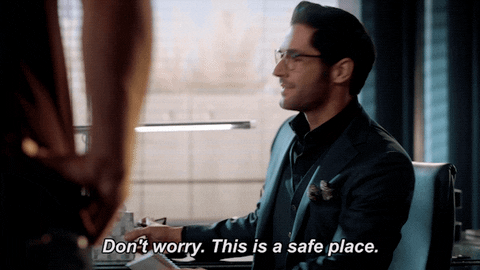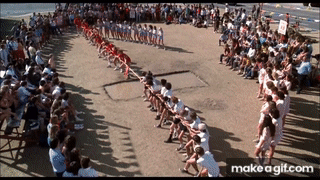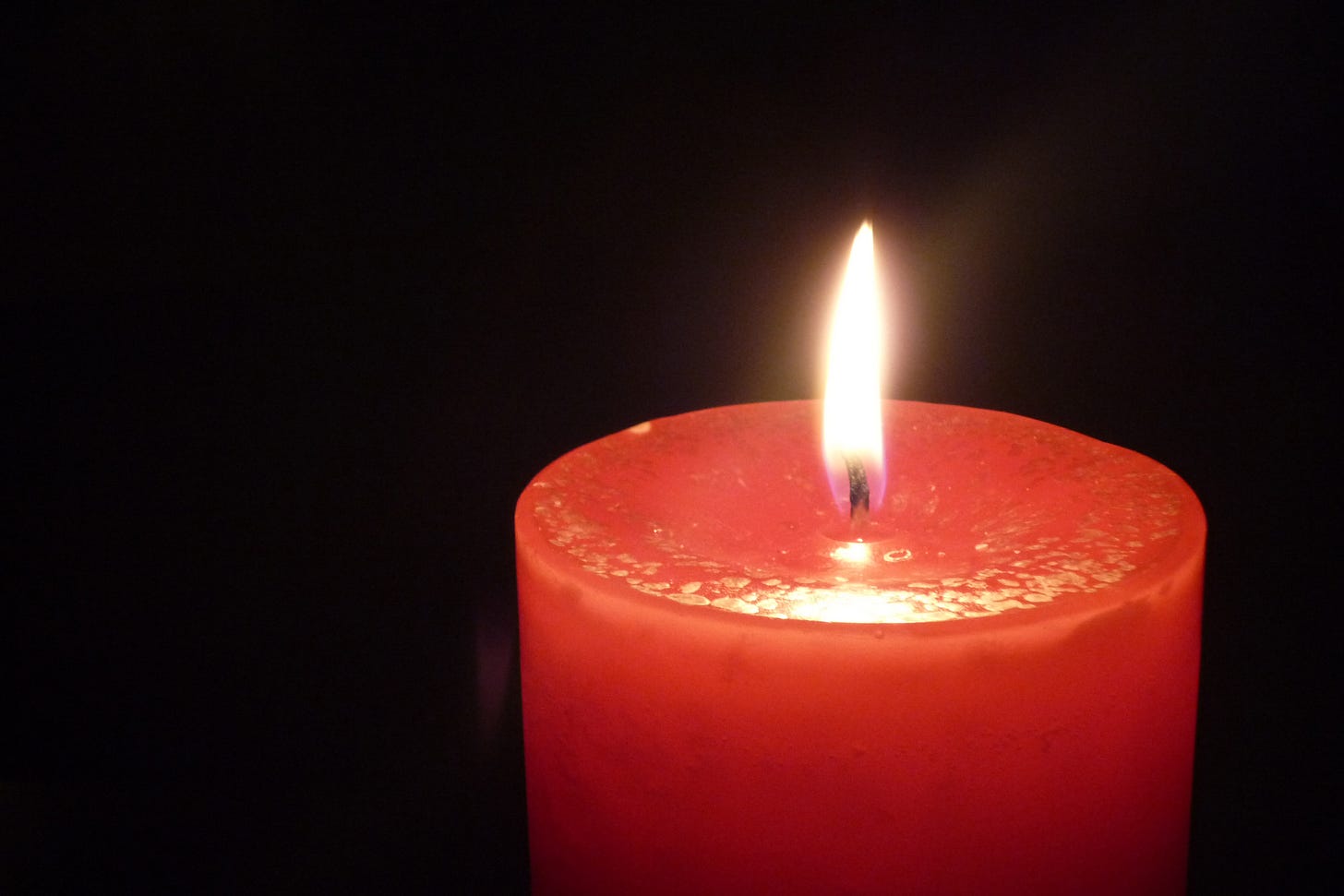I quote several people who I don’t especially care for overall, just because they say something that strikes such a deep chord with me that it is worth sharing. One of them is mega-pastor, Joel Osteen. You know. That guy who refused to let flood victims take shelter in his megachurch because he had just had the carpets redone. I know he was not the originator of this idea, but he was the one I heard it from years ago and it always stuck with me:
He said, “Twenty-five percent of the people you will meet in life will love you no matter what. Another twenty-five love you just fine but can be convinced not to love you by the influence of other people or by hurt feelings or circumstances. Another twenty-five percent do not like you but can be convinced to like you due to the influence of other people or prevailing circumstances. The final twenty-five percent are going to dislike you no matter what you do to try and win them over.”
Mind you, this is not empirical data nor are they precise numbers. We’re looking at a concept rather than counting hairs. I have literally mulled this idea to death for decades.
His point was that we put most of our energy toward the fifty percent of people who either do not like us or are straddling the fence and require us to prove our worth to them. Sometimes, we do this to the detriment of the twenty-five percent that love us.
This lesson stands out for me on this Christmas Night because I noticed earlier this year that my capacity for feeling and recognizing joy is next to nothing. It was a traumatic year. Without going into details, I lost a lot on an emotional level and I am still struggling to get past the necessary scaffolding to see what parts of me are intact. I talked to my friend, Ray, about it. Ray is a crisis counselor and she cared enough to ask me if I was OK. I’m not. I will be and I’m getting to be but I am not there yet. Somehow along the way, joy became definied by a lack of trauma rather than the feeling of joy itself.
Ray suggested that I identify something every day that brings me joy. I had to work it intellectually because I am not currently in a place where I can feel it emotionally.
The rain is coming in tonight and intellectually, I know that brings me joy.
Our holiday celebration happens on Winter Solstice rather than the Christian holiday and so my gift-giving was over this weekend. It’s done and it was successful and intellectually, I know that gives me joy, even if I can’t completely feel it.
My friend, Nicole, wrote me two letters this week and I know that brings me joy.
The gifts I received from different people this weekend were very “me” and I could tell that they put thought into their gift choices for me and I know that brings me joy. I feel seen.
Even if I can’t feel it, I can identify what would bring me joy if I could feel it.
Both Corbie (corbiemitleid.com/) and Dahlia (facebook.com/p/Dahlia-Speaker-and-Author-100063660635705/) did readings for me recently and that not only brought me joy, but insight as well.
A good bit of the personal trauma from 2024 came from my profound misjudgment of what group some people in my life fell into and the stark realization that I had completely misjudged my worth to a few people I care deeply about. One of the hardest parts of life is the cognitive dissonance you feel when someone you thought was in Group #1 (the people who love you no matter what) turns out to be in Group #2 or even (gasp!) Group #3. It feels like there was a wolf in sheep’s clothing hanging out in your safe Group #1 pasture.
In some ways, the people in Group #4 (who dislike you no matter what) are easier to emotionally manage because you can just write them off since you will never win them over. You remind them of their abusive sister or they don’t like your hair or you didn’t vote the way they thought you should. Usually, Group #4 people are easy to identify and you know where you stand with them. They might be cordial to you, but they do not pretend to like you.
Group #2 people (can be convinced to not like you) are challenging because you must constantly prove yourself with them. You will never be perfect and when you inevitably make a mistake, you are disposable to them. Whether you realize it or not, you are forever on trial with these folks and you cannot avoid failing a test you did not realize you were taking. With every encounter, you must prove that you are worthy of their positive attention and loyalty and if you falter, it’s game over before you even realized there was a game.
Group #3 people (can be convinced to like you) are just as dangerous because you sense that they want to like you, so you pursue their approval and affection like a cat chasing a red laser dot. It renders the same results because when that laser turns off, the red light is gone and you realize you were chasing air.
Relationships with both Group #3 people and Group #2 people can be transactional, tenuous, and tedious.
Of course, Group #1 people are wonderful to be around because you can feel safe, relax, be yourself, unclench, and know that if you misstep, as we are all wont to do, they care enough to say, “That hurt me. Can we talk about it because I value our relationship and want to keep you in my life?” I have long said that boundary setting is an act of love because instead of leaving the relationship, you care enough to let the person know what you need in order to feel safe and comfortable with the continuation of the relationship.
Group #2 people don’t have these conversations because you are not important enough to them. There is communication, compassion, and forgiveness in Group #1. Group #2 prefers to walk away rather than do the work.
In the past, I would move heaven and earth to keep a relationship, staying in unhealthy, toxic ones long after they passed their expiration date because I so desperately wanted them to be in my Group #1. I was that person who would do or say anything to keep those Group #2 people feeling good about me. In fact, Group #2 and Group #3 people took up most of my emotional bandwidth and energy.
This year, some switch inside me snapped to the other position and I knew that people who want to stay in my life need to invest in the relationship as deeply as I do. They need to have calm, candid adult conversations when things inevitably go sideways. They need to be open to hearing a different perception, even if it conflicts with their own. Throughout my life, I have loved a whole lot of people unconditionally, no matter how they treated me and that just was not working anymore.
I stopped chasing people. It’s too much work. I turned into “Ms. What Have You Done For Me Lately.” Not that everything in my relationships is transactional, but I can’t be the one doing all the emotional and energetic heavy lifting, all the apologizing, and all of the making amends. I can’t be anyone’s emotional punching bag anymore. I can’t be where they work out all of their projection issues. I can’t be the villain in their story and still hang around. I can’t play the game anymore, so I let go of the rope.
I recently read a book where the author suggested that when you say you “can’t” do something, replace it with you “won’t” do it. That implies a choice and personal empowerment. Feel free to substitute “I won’t” for any of those “I can’t” statements above. I hope all of those “I won’t” statements mean I can be more present for and connected with the people in my life who do those things and who truly show up for my relationships.
I disengaged from most social media. I invest in the people who demonstrate that they want to connect with me in a meaningful way. I will isolate in Group #1 for a while and wish those other three groups all the best life has to offer. I told my son it felt like I spent decades chasing after a train I can never hope to catch and let me tell you, my legs are tired.
The thing is, under all of this, life is pretty good. I know I have the ability to be happy because I have felt it before. I fully intend to get back there. This is a matter of rearranging the mental furniture, cleaning under the mental couches, and sitting back to enjoy the room. I remember a mentor telling me that there was a difference between joy and happiness. Happiness is a state of being and joy is intermittent spikes of excessive good feelings. I am happy, but I don’t feel joy. I am not depressed; I am recalibrating.
That is what the Dark of the Year is for. We turn inward for necessary introspection and find out what is there for us in the dark, but we also decide what we will leave behind in the darkness when we return to the light. The important thing is to make sure we don’t trip over it when we go back into the darkness when the wheel turns again.
Despite what the old adage says, there is a lot of real estate between lighting a candle and cursing the darkness. Sometimes, we have to talk it out first and hear ourselves say the words that summon the candle that will spark light in the darkness.
How fortunate we are to be in tune with the cycles of nature to help us process what we should grow in our lives and what we should leave behind in the fallow fields.
I suppose this is what happens when, back in March, you plant “healthy relationships” as part of your year’s goals.


